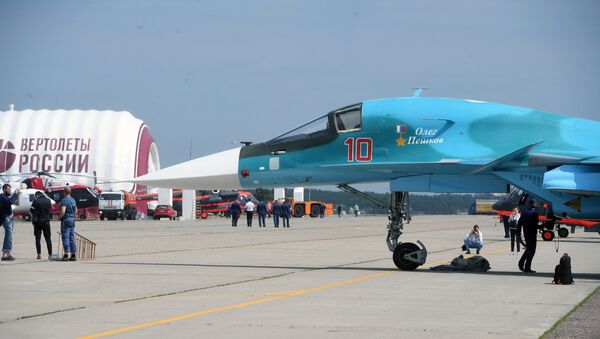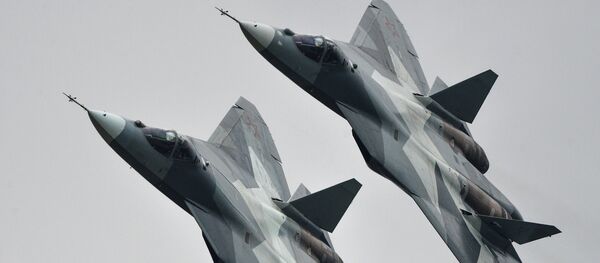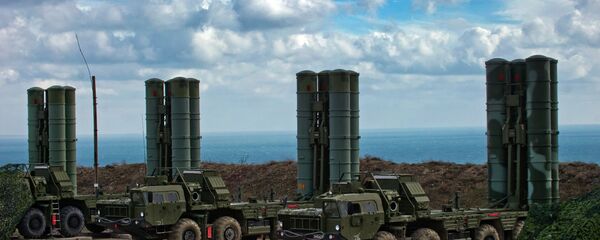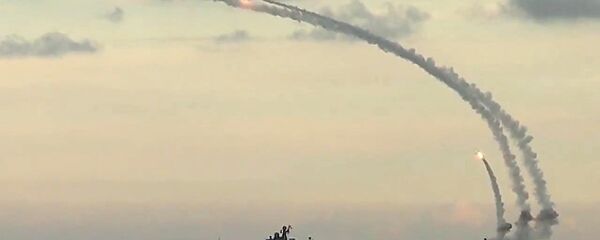The head of Russia's Federal Service for Military-Technical Cooperation Dmitry Shugaev also confirmed huge interest on opening day, saying 170 foreign participants from 50 countries, some 650 pieces of military equipment and 70 official delegations were attending.
Rosoboronexport: 15 Contracts Signed
Russia's Rosoboronexport state arms exporter has held more than 50 talks with foreign delegations, and signed 15 contracts and cooperation deals during MAKS-2017, the corporation said Friday.
"During MAKS-2017 business program, we held negotiations with more than 50 foreign delegations, which resulted in the signing of 15 contracts and cooperation agreements. Our experts made over 50 presentations for delegations from 20 countries at the request of our partners. This exceeded the expected results," Rosoboronexport's delegation head and Deputy Director General Sergey Ladygin said.
Rosoboronexport expects military aviation equipment to constitute over 50 percent of 2017 exports, Ladygin said.
"The countries of the Middle East and of the Pacific Rim will be chief importers of this type of weaponry," he added.
PAK FA: First Stage of Tests End
The first stage of tests of Russia's Sukhoi T-50 (PAK FA) fifth-generation fighter aircraft have been completed, Russian Aerospace Forces Commander Col. Gen. Viktor Bondarev said Thursday.
"Today is a historic event, a preliminary agreement on joint state tests of the first stage of the T-50 plane was signed at the MAKS aviation salon. We begin the second stage of tests. We also received a recommendation on beginning of production of initial batch of planes," Bondarev said.
The Russian Foundation for Advanced Research (FPI) also told Sputnik it had presented the first "nervous system" of PAK FA aircraft designed to improve flight safety.
The president of United Aircraft Corporation Yury Slyusar said that the company was discussing the delivery of first 12 T-50 jets to the Russian Defense Ministry in 2019.
China Interested in Space Cooperation, Arctic Choppers
Russia and China have arrived at a new stage of cooperation in the space industry, China Great Wall Industry Corporation (CGWIC) CEO Yin Liming said.
According to the CEO, joint projects include manned spaceflights, remote probing, navigation systems and other bilateral projects in all areas of space cooperation.
Chinese customers have also expressed interest new unmanned helicopter VRT300, designed to develop the traffic system of the Northern Sea Route and help in the exploration of the Arctic, which was presented by Russian Helicopters for the first time at MAKS-2017.
"Exploration of the Arctic is especially relevant for China, which is planning to become one of the countries that use the Northern Sea Route soon. In this regard, the company notes an interest of potential customers in China to the arctic version of the VRT300 [unmanned helicopter]," Russian Helicopters said.
Turkey Likely to Buy S-400, Iran Undecided
Technical issues of the contract for the supply of Russian S-400 air defense missile systems to Turkey have been resolved, only administrative ones remain, the general director of Russia's Rostec state corporation Sergey Chemezov said.
"The final decision will be made by the Russian and Turkish governments. Negotiations with the [Russian] Ministry of Finance are underway and, most likely, some funds for this project will be provided by Turkey itself, and some will be received in the form of a loan," Chemezov added.
Iran has not yet decided to buy Russia's S-400 air defense systems, Iranian Deputy Defense Minister Brig. Gen. Abdolkarim Banitarafi said.
Head of FSMTC Dmitry Shugaev also said Russia was discussing the deliveries of S-300 air defense system battalions with Serbia.
"Serbian partners are currently expressing their interest in the supply of S-300 SAM battalions. This issue is being discussed," he said.
In Development: Electric, VTOL Aircraft, Cruise Missiles
"Now we are working on new sources of energy and are planning to develop electric aircraft. The main goal is to apply the experience and practices of all design bureaus," Korotkov said.
Meanwhile, the Russian Defense Ministry is considering the development of a vertical takeoff (VTOL) aircraft for aircraft carriers based on the Yak family, Deputy Defense Minister Yury Borisov said.
As for new missiles, Russia's Tactical Missile Systems Corporation said it would finish the development of a new line of cruise missiles with ranges of between 100 and 1,000 kilometers (62-620 miles) by 2020. A new line will feature missiles with ranges of 100, 200, 400 and 1,000 kilometers, company's head Boris Obnosov said.
Obnosov also said the company had presented an X-250 with a laser self-homing head at the exhibition.
"We are the first in our country to master such technologies, and we hope that by the end of the year we will complete the work on this product. This is very important, because we, like the rest of the world, strive to have the targets differentiated, with minimal damage to the civilian population. Unfortunately, usually there is no war in the bare desert," he said.
A new heavy-duty carbon fiber-reinforced plastic for the manufacture of hulls of space vehicles and solar batteries, as well as wings, blades, engine nozzles, were developed in Russia by the Skolkovo resident Sintez-Project, project's coordinator Vasily Aristov said.
"We managed to get a really heavy-duty carbon fiber reinforced plastic. The strength of this material, with the same weight, is eight times greater than that of the most durable steel. The material has a 30 times less moisture absorption than currently used epoxy-based composite materials, and also 100 times better crack resistance, high temperature resistance and dimensional stability," he explained.
Cooperation With Europe
Chair of the Executive Board of German Aerospace Center Pascale Ehrenfreund told Sputnik that his company was interested in cooperation on an international research space station.
GIFAS, the French aerospace industries association, is open for cooperation with Russia in the area of light helicopters production if helicopters are certified by European organizations, Thomas Chatel, a manager in charge of Europe, Russia and Turkey at GIFAS, told Sputnik.
"We hope that in the field of light helicopters, we will have some opportunities to cooperate more closely. In principle, all civilian helicopters provide an opportunity for cooperation between France and Russia. And we, first of all, can provide aviation equipment and engines, because this is key for light Russian helicopters… And I think that if the Russian side will have an interest in using our equipment in its helicopters in the future, of course we are open to all kinds of cooperation," Chatel said.
According to Chatel, GIFAS wants to be sure that all the cooperation that will be established with Russian companies can be certified in Europe.
"We must be sure that Russian products can be certified not only by the Russian authorities, but also by international organizations, in particular by the European Aviation Safety Agency," Chatel added.
Ehrenfreund, whose company is a regular MAKS participant, said the telescope presented on their stand that would fly to international space station next year, is produced with Russian-German cooperation.
Czech companies are also interested in Russian investments in the aerospace sector, Business Development Manager for Aerospace of Czechinvest Erik Bolebruch told Sputnik.
Libor Hanus, the director of Russian operations at CzechInvest, said that Czech aerospace companies were already in touch with Russian companies and looked forward to anti-Russia sanctions being lifted to further expand cooperation.
Netherlands may also cooperate with Russia in building parts and the maintenance of aerospace vehicles, international service engineer of Moba bv Frank Mars told Sputnik.











